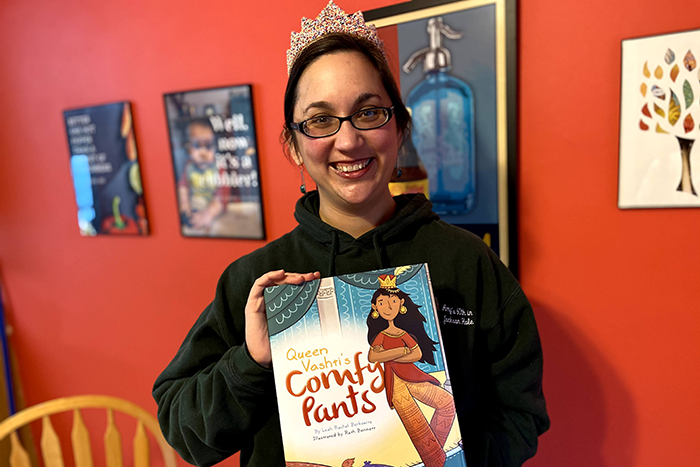When the Queen Says No

Reprinted from ReformJudaism.org
By Rabbi Leah Berkowitz
A few years ago, on the morning of Purim, I woke up with a rhyme in my head: I am not in the mood to dance, for I am in my comfy pants!
I had been wanting to write about Queen Vashti for a while. A big part of my rabbinate and my writing focuses on uplifting the stories of women in the biblical narrative, especially those who do not get enough attention.
Queen Vashti only gets a few sentences in the first chapter of the book of Esther, yet she has captured the imagination of rabbis, modern feminists, and fiction writers because she said "no" to a group of powerful men - including her husband.
No reason is given in the plain text for Vashti's refusal, but the rabbis invent several. In one midrash, Vashti appears to be strategizing, telling her husband, "If they find me beautiful, they'll kill you and take me for themselves. If they don't find me beautiful, you'll be disgraced." (Esther Rabbah 3:14) Another rabbi suggests that something about her body made her embarrassed to appear in public, either because she had leprosy, or maybe even a tail. (Babylonian Talmud Megillah 12a-b)
(By the way, there is nothing in the Bible about Vashti being asked to "dance naked." The text tells us that she was summoned to appear "wearing a royal diadem, to display her beauty.")
As for me, I liked the idea of a queen saying "no," especially under the circumstances described in the megillah. But I didn't love the rabbis' explanations. If we were going to celebrate Vashti as a role model of empowerment, I wanted to imagine a more relatable reason why Vashti might say "no."
It wasn't until this rhyme popped into my head that it all came together: as an introvert in an extroverted profession, I strongly identified with someone who didn't want to go to a big, loud, chaotic party - whatever the reason. Perhaps Vashti didn't want to attend the king's party because she didn't feel like getting dressed up to go out.
Not wanting the idea to get away from me, and possibly not wanting to get out of bed, I typed out my first draft on my phone while still in my pajamas.
I was delighted when publishers were interested in the resulting rhyme. I was also fascinated by one piece of feedback I kept getting - everyone wanted me to make sure that Vashti had a good reason for refusing the king's order. She couldn't be "needlessly defiant." She couldn't just say "no" because she felt like it.
My later drafts played up that Vashti was having a party with her own friends - it would be rude for her to leave them - and made the king stomp and shout so that he would look like more of a bully (my older brother says the illustrations look like he did as a teenager, but I promise that's just a coincidence).
However, I still think about that feedback. For one thing, in the megillah, Vashti doesn't give a reason for her refusal. But more importantly, why shouldn't a person say no, just because they feel like it? And if a queen can't do that, who can?
Whether it is tuning into the kinds of activities we do and don't enjoy, resisting peer pressure and bullying, or asserting our bodily autonomy, learning to say a firm, unqualified "no" is an important lesson for our children.
It's not a bad lesson for adults, either. Too often, we feel compelled to say "yes" to everything, even if we are overscheduled, exhausted, uncomfortable, or simply not interested. How might we channel our own "inner-Vashti" and make decisions based on what we want, or need, for ourselves?
When Queen Vashti's Comfy Pants came out in early 2021, we were all at home in our comfy pants. We didn't have much choice about whether to go out or not, though somehow there were still plenty of invitations to "appear" before one group or another. I got to do my book tour from my dining room (in comfy pants, of course!). Friends and colleagues from around the world sent me pictures of themselves, and their children, in pajamas or sweatpants, reading my book.
Soon, I heard from parents of young children that the book was cited in some act of defiance, that chores or outings were refused on the grounds that their children were in their "comfy pants." Their kids were using Vashti as a model for how to say "no." Their parents were a little bit annoyed about this, but, they told me, they were also proud.
Rabbi Leah Rachel Berkowitz is the spiritual leader of Congregation Kol Ami in Elkins Park, PA and the Immediate Past President of the Women's Rabbinic Network. She is the author of two children's books: The World Needs Beautiful Things (Kar-Ben 2018) and Queen Vashti's Comfy Pants (Apples & Honey Press 2021), as well as the middle-grade midrash collection Maybe It Happened This Way: Torah Stories Reimagined with co-author Erica Wovsaniker (Behrman House 2022). You can find her on social media @rabbilrb or online at leahrachelberkowitz.com.

